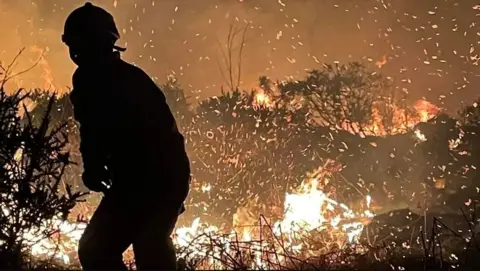Firefighters' plea amid busy wildfire season
 Sedbergh Wildfire Team
Sedbergh Wildfire TeamCumbria is under an extreme wildfire warning and the county's largely on-call fire service is braced to tackle the wide-reaching blazes. With a high number of the fires being caused by members of the public, two firefighters describe the dangers they face, and the toll it takes on their families.
Phil Gardner is ready for a busy summer.
As the on-call watch manager at Sedbergh fire station, he has noticed wildfires becoming increasingly common over the last 10 years.
"Everything's like a tinderbox," he said of the current situation.
The vegetation is dry and the lush growth has yet to come through, with problems already being caused.
Wildfires take a toll on people's livelihoods, obliterate wildlife and put firefighters' lives at risk, on-call watch manager at Appleby fire station Neil Aitken added.
"Come to enjoy the countryside, but be safe, be responsible," Mr Aitken said.
'You don't get any warnings'
On-call firefighters maintain regular jobs, but respond to emergencies - dropping whatever they may be doing to respond to a call out.
Mr Gardner, 44, remembers watching a nativity performance at the school village hall when his pager went off, alerting him to an incident.
"There was a big rattle of chairs and five of us ran out," he said.
"Apparently, the kids just carried on."
 Neil Aitken
Neil AitkenMr Aitken, 62, remembers putting the first roast potato in his mouth one Christmas Day when he got called to attend a fire.
"Four hours later we're still out, and I come back to a Christmas lunch that's been under the grill for hours," he laughed.
He recalled a wildfire in Lancashire he and his team were called to.
"We went down initially for 24 hours, 10 days later we managed to get back home," Mr Aitken said.
Mr Gardner said: "There's no predictability about it either, you know?
"It could happen at anytime, day or night. You don't get any warnings."
'Worst day of somebody's life'
Tackling wildfires is a long, hot and arduous job, Mr Gardner said.
Getting all the equipment up the Cumbrian fells, sometimes on foot, is an "absolute nightmare", he added.
"You can't work for long in the fire kit because it does get very hot," he said.
"You're literally stood, like, a metre or two metres away."
Ten to twelve hour days during those types of incidents are common, Mr Aitken said.
Mr Aitken, who like Mr Gardner joined the service at the age of 19, said he was getting to the twilight of his career but, in his head, he was still enthusiastic to help.
"Where you're going out, it's probably the worst day of somebody's life, and you can go and you can make a difference," he said.
"It's just my body shouts a bit at sometimes."
'Carelessness risks lives'
They are asking people to tidy up after themselves when they have been out in the countryside.
One wildfire was caused by a bit of broken glass which had magnified the suns' rays and sparked a blaze, another by a disposable BBQ.
The direction of the wind meant the BBQ was still there, with a couple of square kilometres of burnt grassland in its wake, Mr Gardner recalled.
"It can be annoying at times," Mr Aitken said.
"Just one person's carelessness, it's putting other people's lives - firefighters' lives -at risk."
